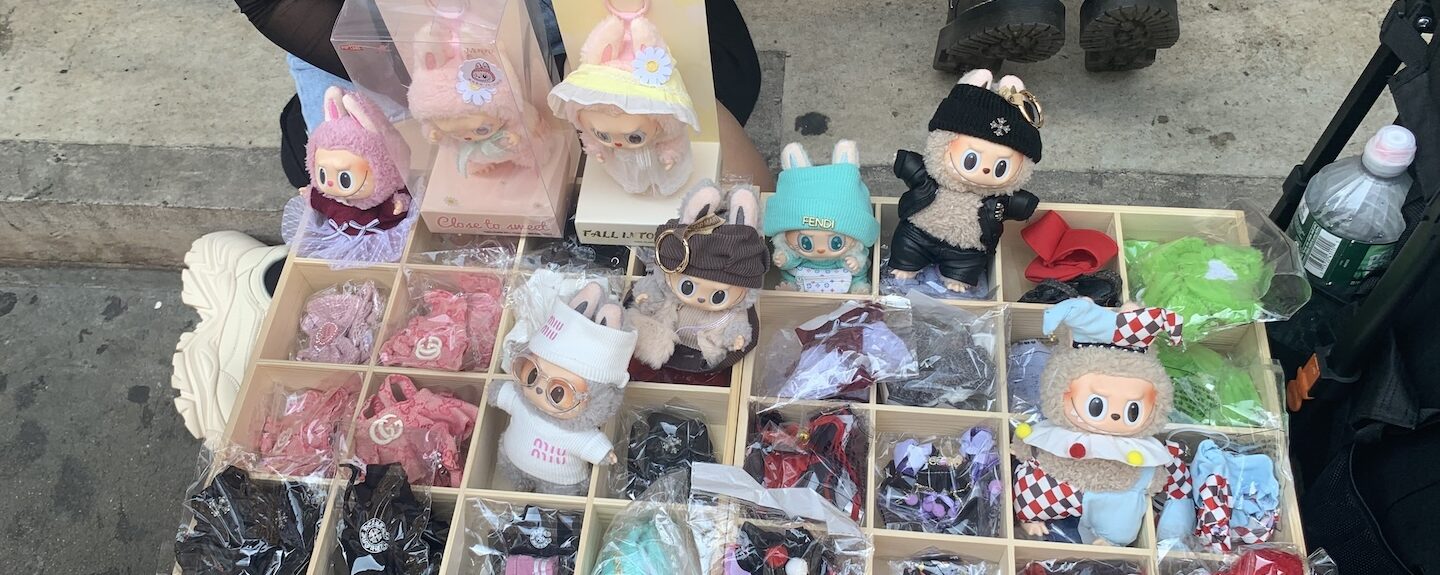Business Lifestyle & Culture
Frenzy over fuzzy, furry key chain
By Chanelle Liu
Inside the compartments of the computer monitor-sized organizer were clothing customized to fit fluffy, hand-sized, keychain versions of Labubu dolls, which also come in larger sizes.
To the right of that sidewalk display, three rows of boxes of Labubus were stacked. Some were opened, so customers could see which color they desired.
“It’s trendy, it’s cute, it’s pretty sizable. So, on top of celebrities having it, it’s a little collectible we can have, plus the blindbox aspect. I think that’s what adds to the charm,” said Elizabeth Lopez, sitting on a stool beside the organizer.
“Girls can’t say no to cute things,” interjected Ada Yu, Lopez’s partner in selling Labubus.
Designed by Hong Kong-born artist Kaisung Lung, the Norse mythology-inspired Labubus first went on sale in 2019 at Pop Mart, a Chinese company. The amount of sales to social media influencers, celebrities and netizens who have fallen in love with these dolls has soared. In 2024, globally, consumers spent $1.8 billion on Labubus, whose starting cost is $16. On eBay, some rarer Labubus have sold for hundreds of dollars. Sotheby’s auction house in Hong Kong listed a set of three for more than $25,000.
Even with many people clamoring for a doll, only 5% of them are available for purchase on Pop Mart’s websites and in stores. In May, the company pulled the dolls from stores after customers started fighting over them.
In Manhattan, at “New York Pen & Stationery Shop,”. Labubus sit next to the cashier’s register. After his daughter suggested it, shop owner Kamal Ahamad started stocking the toys, sold in blind boxes bearing Labubu shapes in different colors depending on the collection. The Exciting Macaron Collection contains pink to represent the color of lychee berries, baby blue to represent sea salt coconut, green to represent green grape, light brown to represent toffee, beige to represent soymilk, and light gray to represent sesame bean. And six for the Big into Energy collection: pink to represent love, orange to represent happiness, pink and yellow for loyalty, green for serenity, blue for hope, and a combination of purple and blue to express luck.
The collections of Labubus have spiked Kamal’s sales, especially in the last few weeks.
“It’s an investment. We buy them … for people to buy,” Ahamad said, chuckling. “Right now, very good impact. You never know in the future.”
Pop Mart has been giving TikTok influencers a six-box set of Labubus, which are listed, for example, for $219 on some resale sites. On Instagram, Labubu fans have posted backpacks, designer purses and jean belt loops decorated with what they often describe as little gremlins.
K-pop stars such as Blackpink’s Lisa and Rose have helped to popularize the Labubus name throughout Asia.
On that Manhattan sidewalk, business partners Lopez and Yu were also offering for sale Labubu clothing, including fake Miu Miu sweatbands and T-shirts with Gucci logos. The mini outfits and accessories with brand names go for $25, and their unbranded clothes go for $8. Their boxed blind boxes go for $45, and their unboxed ones go for $40.
“It’s what the market is,” Yu said. “People who aren’t fans of Labubu may see it as expensive, but that is what the market is calling for.”
They purchase their stock online from China.
“In terms of collectables,” Lopez said, “it is a good thing because it’s harmless.”
Then, again, she added, “If you want to look at it in the view of consumerism, that means it probably isn’t a good thing. But, at the end of the day, in our society, we are always going to be consuming. So, in the grand scheme of things, it’s cute, it’s harmless … They bring, like, a sort of collector’s joy.”
Charlie Li described Labubu as ugly-cute, which is what she finds unique about it, as it reminds her of her pet dog. “I have a pug, she’s like ugly-cute,” she said.
Her Labubu also adds pop to her work attire. “It’s just an additional color to my very sad, boring, corporate clothing,” said Li, who, that day, sported a black business suit, a black leather work bag with a cream and turquoise colored scarf tied around the handles, and a cherry blossom pink Labubu was clipped to an exterior loop.
She bought her Labubu at the World Trade Center’s Popmart, a year before they took off in the United States.
The cost? “Under $20, which is better than it is now,” Li said.


